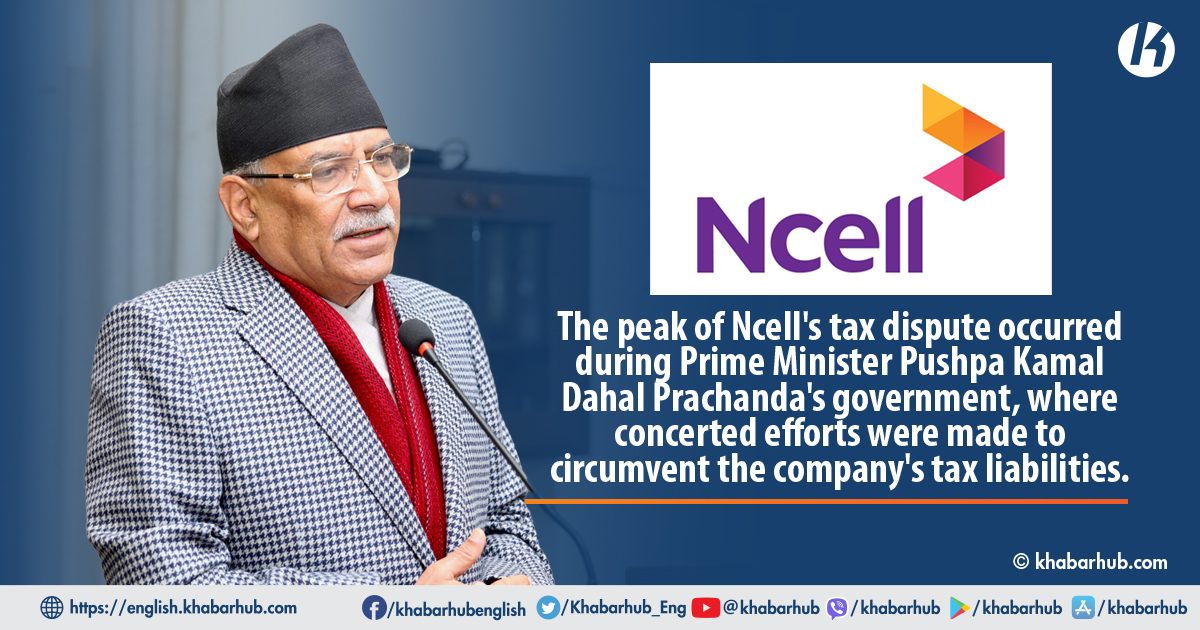KATHMANDU: Telia Sonera, the primary investor in Ncell, found itself embroiled in a contentious dispute over the non-payment of capital gains tax during the sale of shares to Axiata.
Prime Minister (PM) Pushpa Kamal Dahal Prachanda was in office in 2073 BS when the issue escalated from the streets to the Parliament.
Axiata acquired shares from Telia Sonera in 2072BS, a period marked by the ongoing constitution-making process and the Indian embargo, which overshadowed Ncell’s concerns.
The situation intensified when India lifted the embargo, bringing Axiata’s case into the spotlight.
Prachanda assumed the role of Prime Minister alongside Sher Bahadur Deuba after breaking ties with CPN-UML Chairman KP Oli, with Krishna Bahadur Mahara serving as the Finance Minister.
The peak of Ncell’s tax dispute occurred during Prachanda’s government, where concerted efforts were made to circumvent the company’s tax liabilities.
Prachanda sought to facilitate Ncell’s tax evasion through Finance Minister Mahara.
The Auditor General’s Office, responsible for tax collection oversight, faced internal pressure to downplay Ncell’s tax issues, with Sukdev Bhattarai Khatri actively involved in the investigation.
Various attempts were made by the government machinery to influence Khatri into omitting Ncell’s tax matters from the annual report.
The Auditor General’s report inadequately emphasized income tax exemptions in the name of tax relief, even before the formation of the tax evasion commission led by Chudamani Sharma, which, according to officials, facilitated billions in tax evasion.
Finance Minister Mahara played a pivotal role, attempting to arrange meetings with Khatri through his personal secretary and sending repeated messages.
In a bid to dissuade Khatri, Finance Secretary Shantraj Subedi and Revenue Division’s Rajan Khanal conveyed, “Avoid addressing Ncell’s tax payments in the report; the minister will not approve, jeopardizing our employment prospects.” Consequently, the matter was excluded from the General Account’s report, raising questions about the transparency and integrity of the government’s handling of Ncell’s tax obligations.
Khatri, perceiving executive interference in the constitutional body of the Auditor General, responded firmly, insisting they refrain from meddling.
When Mahara’s attempts to convince Khatri at the staff level proved futile, he sought a direct meeting.
Mahara persistently called through his personal secretary, but Khatri, in the final stages of report preparation, deferred the meeting, citing time constraints.
Prime Minister Dahal also engaged in discussions on the Ncell tax dispute, personally calling Khatri.
However, Khatri, sensing the implied message to exclude Ncell’s tax issue from the report, responded when summoned to the Prime Minister’s residence.
During the meeting, Prachanda, anticipating Khatri’s likely rejection of his proposal, opted to downplay the matter rather than delve into further discussions.
At that juncture, Prachanda resorted to administrative tactics to conceal the issue.
Khatri, with a reserved stance, shared minimal details about those times, stating, “There was pressure from both political and administrative levels, but what I resisted was the truth.”
Emphasizing a reluctance to discuss individual actions, Khatri highlighted the broader challenges he faced.
Despite intense political and staff pressure, the 54th report of the Accountant General unequivocally addressed Ncell’s tax evasion, recommending payment.
Yet, for his principled stance, Khatri faced repercussions, missing out on the promotion to Auditor General.
Prachanda appointed Tankamani Sharma to the role instead. Following this appointment, Khatri resigned.
In an hour-long conversation with President Bidya Devi Bhandari, Khatri sought to elucidate the nuances of the 54th General Account report.
Reflecting on the political climate, Khatri noted, “Among high-level leaders at that time, only Bhandari acknowledged the need for Ncell to pay taxes.”
The tax dispute involving Ncell reached its zenith during Prachanda’s tenure as Prime Minister and Mahara’s stint as Finance Minister, prominently highlighted by the Office of the Auditor General.
The pressure exerted by Prachanda and Mahara also extended to Acting Auditor General Khatri.
The ambiguity surrounding Ncell’s tax dispute is not confined to Prachanda’s administration; former Prime Minister Oli and Finance Minister Bishnu Paudel from the preceding government are implicated in this controversy.
It appears that Telia Sonera is seeking political-level communication as Ncell shares are transferred to the Malaysian company Axiata.
Telia Sonera initiated a resolution attempt by sending a letter to the Prime Minister’s Office and the Ministry of Finance on December 21, 2015.
The objective was to address the payment of profit tax resulting from the sale of shares through a meeting.
Unfortunately, then Prime Minister Oli and Finance Minister Paudel disregarded the communication.
Khatri revealed that they provided no response or commitment to meet, facilitating an easy avenue for tax evasion, constituting undisclosed assistance.
Chudamani Sharma, then head of the Internal Revenue Department and Ncell’s special spokesperson, consistently advocated for tax payment.
Despite Sharma’s insistence, then Prime Minister Oli and Finance Minister Paudel maintained silence on the matter.
Sharma, even in the Public Accounts Committee, argued for Ncell’s obligation to pay profit tax due to double taxation.
Sharma contended that Oli had already resigned as Prime Minister when Prachanda assumed the role.
Former secretary Dwarikanath Dhungel, who approached the Supreme Court advocating for Ncell to pay over Rs 66 billion in capital gains tax, alleged collusion between the tax administrator and high political leadership in Ncell’s tax evasion.
This case extends its roots to Bishnu Paudel’s predecessor as finance minister, Ram Sharan Mahat.
Mahat, allegedly favoring tax avoidance, has been accused of benefiting numerous traders.
There are claims that Mahat remained silent on taxing Ncell during his tenure.
Officials from the Auditor General’s office raised concerns, stating that Mahat established a tax evasion commission with his appointees, hinting at significant income tax exemptions for businessmen.
The anniversary celebration took place at the residence of a controversial businessman in Sunakothi, Lalitpur, further fueling the controversy surrounding Ncell’s tax evasion.
The Auditor General’s report inadequately emphasized income tax exemptions in the name of tax relief, even before the formation of the tax evasion commission led by Chudamani Sharma, which, according to officials, facilitated billions in tax evasion.
The 10th commission led by Sharma garnered attention, primarily because the Accountant General documented its controversial decision in the report.
Consequently, Khatri asserts that the three governments succeeding the 2070 elections have been entangled in Ncell’s tax evasion case, portraying it as an ongoing issue in the present context.
However, Prime Minister Prachanda’s association with Ncell goes beyond that.
In 2073 BS, amid the escalating capital gains tax issue involving Ncell, Prime Minister Prachanda, then in office, vocally advocated for Ncell.
The ‘No Tax, No Ncell’ campaign echoed through the streets, while Prime Minister Prachanda was more concerned about steering clear of the approximately Rs 66 billion in profit tax that Ncell was obligated to pay.
On the 29th of Chaitra, 2072, it was disclosed that Ncell had sold shares to Telia Sonera, with Axiata acquiring 80 percent of the shares.
The day after the share transaction announcement, Gilgraj Mainali, head of the Multinational Company Branch, penned a letter urging the payment of capital gains tax on Ncell’s purchase and sale.
However, instead of heeding the advice, Director General of the Internal Revenue Office, Chudamani Sharma, sought ways to circumvent the tax.
Under Sharma’s influence, the Ministry of Finance and the Prime Minister’s Office were leaning towards granting Ncell a similar exemption.
At that juncture, Prime Minister Prachanda instructed Chief Secretary Somlal Subuvedi to present a proposal to the Cabinet to transfer Axiata from Telia Sonera.
Subedi, asserting that matters related to the tax office should be brought before the cabinet, declined to submit the proposal.
According to Subedi, Prime Minister Prachanda sent a proposal through a third party, emphasizing the need to move Ncell’s tax issue to the Cabinet.
Subedi recounted, “At that time, we were asked to submit a proposal, but it was halted as this falls under the jurisdiction of the Tax Office, not the Council of Ministers.”
Prachanda’s attempt to aid Ncell in tax evasion faced setbacks, as both the Auditor General’s Office and the Chief Secretary were uncooperative.
However, when Sharma assumed the role of Auditor General and prepared the 55th report, the specifics related to Ncell were omitted.
When responding to the Public Accounts Committee, Prachanda asserted that he did not intervene to discourage tax payment.
The scrutiny of Prachanda’s close ties with Ncell resurfaced three years later on 26 Baisakh 2076, with a special investigation.
Celebrating his 50th wedding anniversary on that day, Prachanda marked the occasion despite his wife Sita Dahal’s ailing health.
The anniversary celebration took place at the residence of a controversial businessman in Sunakothi, Lalitpur, further fueling the controversy surrounding Ncell’s tax evasion.
Meanwhile, Nirja Gobind, implicated in the Ncell tax evasion controversy, celebrated his birthday at Shrestha’s palace.
Shrestha is reportedly a businessman residing in Belarus.
Upendra Mahato, a key figure in Ncell since its inception, sold his shares to Nirja Gobind Shrestha in 2068 BS.
Mahato divested himself by selling his 20 percent stake in Ncell to Shrestha, his business partner at the time. During this transaction, the Big Taxpayer Office alleged that approximately 3 billion rupees in revenue were defrauded when Synergy sold to Upendra, and Upendra subsequently sold to Nirja Gobinda.
Shrestha, who played a role in celebrating Prachanda’s marriage anniversary, was implicated in tax evasion related to this sales transaction.
When Telia Sonera sold Ncell, Shrestha held a 20 percent stake.
While Telia Sonera sold 80 percent of its Ncell shares to Axiata, Shrestha also sold his 20 percent shares to Bhawana Singh Shrestha.
This sale involved a tax amounting to around 11 billion rupees, a figure that had already been determined by the Big Taxpayer’s Office. The legitimacy of this tax remains a controversial subject.
Ncell finds itself entangled in an old controversy over tax evasion as its shares are once again sold.
According to the 54th report of the Auditor General, during that period, Ncell held 50 percent ownership of Cyprus Services Limited, 40 percent of a Telecom Pvt Ltd, 5 percent from an individual, 3 percent from Telecommunication Limited of Pakistan, and 2 percent from Bangladesh Telecom.
Questions arise regarding the committee formed by Prime Minister Prachanda to investigate the matter.
The committee, led by former Auditor General Tankamani Sharma, is facing scrutiny for Sharma’s alleged favoritism towards Ncell.
Acting Auditor General Sukdev Bhattarai Khatri from the then Auditor General’s Office extensively detailed Ncell’s tax dispute in the 54th report.
However, when Sharma assumed the role of Auditor General and prepared the 55th report, the specifics related to Ncell were omitted.
Sharma, appointed by Prachanda himself, faces persistent inquiries as to why he excluded those details in the 55th report.
As the committee’s coordinator, Sharma remarked to Shilapatra that certain matters are recurrent, stating, “There is no need to reiterate issues already covered in the report. If we detail everything, the 60th report will be extensive.”
Former Secretary Dwarikanath Dhungel insists that contentious issues should be included in the report.
Ncell appears to have harbored intentions of tax evasion in its purchase and sale transaction with the Cyprus company nearly 12 years ago.
In this incident, it seems that Ncell sought to manipulate the valuation of its shares to evade government taxes.
Allegedly, tax administrators played a supporting role in this scheme, where shares valued at Rs 91,000 per share in 2011 were deceptively valued at only Rs 1,000 per share during the purchase and sale with the Cypriot company in September 2011.
According to the agreement with Services Limited Cyprus on September 14, 2011, 40 percent of shares (40 thousand shares) and 25 thousand shares of right shares were sold to Services Limited Cyprus for Rs 25 million within 45 days.
Subsequently, the foreign company based in Sweden, the owner of Services Limited Cyprus, disclosed in its audit and annual report that it spent about 3.68 billion (295 million Swedish kroner) to acquire an additional 50 percent (50 thousand shares) share ownership of Ncell on April 26, 2012.
It appears that among the 50,000 shares, 25,000 shares were obtained from the ownership of Telecom Pvt.
The Auditor General, in addition to questioning the undervaluation, asserted that the investors’ declared value of Rs 1.84 billion (295 million Swedish kroner) indicated an intention to evade taxes by establishing an intermediary company amidst the undervaluation.
During that time, the Accounts General recommended that the profit of Rs 1.82 billion from the initial purchase price of Rs 25 million, along with the deduction of expenses, should be assessed and collected in accordance with subsection 2 of Schedule 1 of the Income Tax Act, 2058.
Initially, the Nepal Rastra Bank was informed that the dollar’s interest should be up to 11 percent, but Ncell later reduced the claimed interest rate to 6 percent due to questions raised by Rashtra Bank officials at that time.
Meanwhile, in 2065, the Department of Industry approved the acquisition of 50 percent (50,000 shares) of Ncell’s share structure by a services limited company in Cyprus from an international limited company in the UK for 5 million rupees.
According to the 54th report of the Auditor General, during that period, Ncell held 50 percent ownership of Cyprus Services Limited, 40 percent of a Telecom Pvt Ltd, 5 percent from an individual, 3 percent from Telecommunication Limited of Pakistan, and 2 percent from Bangladesh Telecom.
Pages 54 and 85 of the foreign company’s annual report based in Sweden in 2011 reveal the purchase of 51 percent of Cyprus Services Limited shares for 2.3 billion (191 million Swedish kroner).
Based on the 54th report of the General Account, it appears that Ncell attempted tax evasion from the outset.
According to Sukdev Bhattarai, a key contributor to the report, Ncell engaged in dubious practices even during the investment phase.
Initially, the Nepal Rastra Bank was informed that the dollar’s interest should be up to 11 percent, but Ncell later reduced the claimed interest rate to 6 percent due to questions raised by Rashtra Bank officials at that time.
Khatri’s analysis suggests that a higher interest rate would facilitate Ncell in repatriating a significant portion of its income abroad.
Additionally, Ncell was found to have misrepresented its initial investment.
According to Khatri, although Ncell claimed to have invested 10 crores at that time, the actual capital amounted to only 6.5 crores.
Meanwhile, it has come to light that Satishlal Acharya, a non-resident Nepalese residing in Singapore, assumed the role of CEO for Ncell, three months ago.
This move is part of a strategic plan aimed at securing full ownership of the company.
Following the departure of Andy Chong, previously appointed by Malaysian investor Axiata Limited, Acharya appointed his trusted associate, Jabbor Kayumov, as the CEO and Managing Director of Ncell.
The decision regarding Kayumov’s continued leadership will be made after Acharya successfully completes the acquisition of complete ownership, and sources indicate that Acharya has no intention of transferring ownership to the government by 2029.
Kayumov, who previously worked in Smart Cell, another company owned by Acharya, has significantly altered Ncell’s operational approach and procurement processes.
Born in Tajikistan, Kayumov boasts two decades of experience in the telecommunications sector.
Chong, now returned, has assumed the role of Group Chief Corporate Officer at Ajita.









Comment